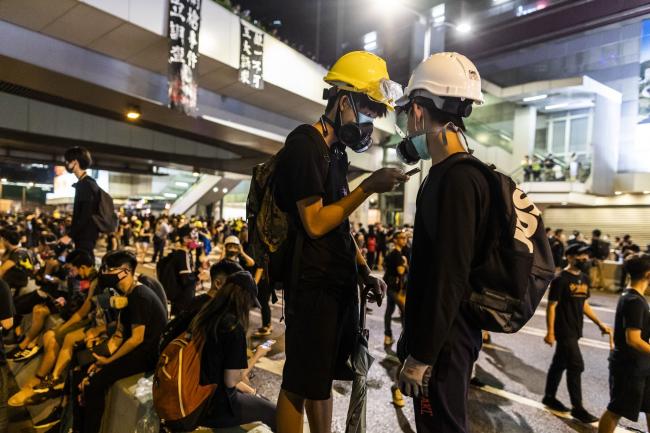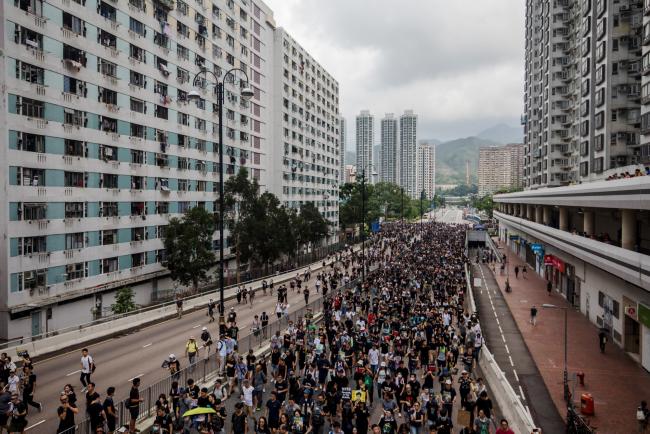(Bloomberg) -- On a sweltering Sunday afternoon in Hong Kong’s Sha Tin district, not long before police battled protesters with tear gas and rubber bullets in several locations nearby, eager homebuyers lined up for hours.
They were there to view mock-up apartments for an 840-unit development currently under construction, and many liked what they saw. Subscriptions exceeded the number of apartments on offer by 24 times, thanks in part to prices that were 10% lower than comparable homes in the area.
Hong Kong’s worst political crisis in decades has stunned the world with near-daily scenes of violent anti-government demonstrations. But so far at least, the turmoil has done little to dent the city’s passion for real estate. Even as some protesters rail against stratospheric housing costs, there are plenty of bargain hunters willing to bet that prices won’t fall much in an economy with record bank deposits and a chronic lack of supply.
“If the project is appealing, the customers will come out for sure. This project’s location is ideal and the pricing is attractive,” said Tony Cho, an agent with Centaline Property Agency Ltd. who was soliciting potential buyers outside the show flat.
That property should remain largely unscathed by an episode that set off a stock-market swoon and heaped damage on various sectors of the economy might sound counter-intuitive, especially given that Hong Kong has the world’s least affordable housing. Embattled leader Carrie Lam has warned of the city sliding into an “abyss,” and says economic damage could be worse than during the deadly SARS virus outbreak in 2003.
But market watchers point to several factors, some unique to the city, that serve to prop up prices -- including, in a roundabout way, the protests themselves.
Two months after a proposed extradition law triggered mass protests, overall housing prices are marginally above where they stood when the unrest started. Centaline’s main property index hit a record in late June, and has since retreated 1%.
Bank of America Corp (NYSE:BAC).’s Karl Choi has one of the more bearish market forecasts, predicting a 10% short-term price drop because of the protests, similar to a short-lived slump in 2018. Several other analysts are calling for single-digit declines.
In Choi’s analysis, the overwhelming housing supply shortage -- about 38,000 units over the next six years by one estimate -- puts a cap on the scope for price weakness. As Lam moves to shore up popular support, Choi expects she’ll free up more land for public housing. That means less private-market supply, which could prop up prices.
That’s not to say the market is breezing past the unrest. Just this week, developers including CK Asset Holdings Ltd. and Sun Hung Kai Properties Ltd. decided to postpone sales of new multibillion-dollar projects. And transactions in the secondary market are down sharply, especially for luxury homes.
Ultimate Threat
Perhaps the ultimate long-term risk to the property market would be the loss of Hong Kong’s status as a key international financial hub, said Patrick Wong, an analyst at Bloomberg Intelligence.
Many prospective buyers are taking a wait-and-see approach to gauge whether the turmoil could lead to bargains, said Joe Chan, a principal account manager at Centaline.
For Janice Wong, a 28-year-old human resources worker who got married last year, the protests brought with them an opening. Wong and her husband bought a government-subsidized flat for about HK$5 million ($638,000) in July just as tensions reached a fever pitch. The income cap for a two-person family to buy government-subsidized apartments is set at HK$58,000 a month -- 1.7 times the median income in the city.
“It’s because of the protests that we decided to resume our apartment hunt,” said Wong, who had given up on house-hunting earlier in the year because of the frothy market. “The room for bargains is larger now.”
The relentless surge in home prices since 2003 has caused headaches for successive administrations because it exacerbated a wealth gap that’s among the widest among developed economies. For the young people who formed the core today’s protests and led the so-called Occupy Central campaign in 2014, owning a home is seen as a distant prospect.
Lam came to power in 2017 with an ambitious agenda to increase supply, after years of administrative cooling measures failed to damp price gains. Her government has proposed a range of supply-boosting initiatives, from taking over parts of a golf course to a giant land reclamation project off the island of Lantau.
As the unrest ties up Lam’s administration, those plans might take a back seat. Instead, she’ll probably focus on shorter-term measures to prop up the ailing economy, like the $2.4 billion stimulus announced Thursday, said Ryan Ip, a researcher at Our Hong Kong Foundation.
Meanwhile, Billion Development & Project Management Ltd., which owns the project that was marketed in Sha Tin, sold all units on offer on Saturday, the first day of taking firm orders. The developer said it expects to announce the sale plan for the next batch of apartments this week.
“It’s true that people have a strong demand for homes -- it’s a fact,” Anthony Poon, the company’s director of projects, sales and marketing, said before sales started.
(Corrects spelling of Hong Kong in first paragraph.)

